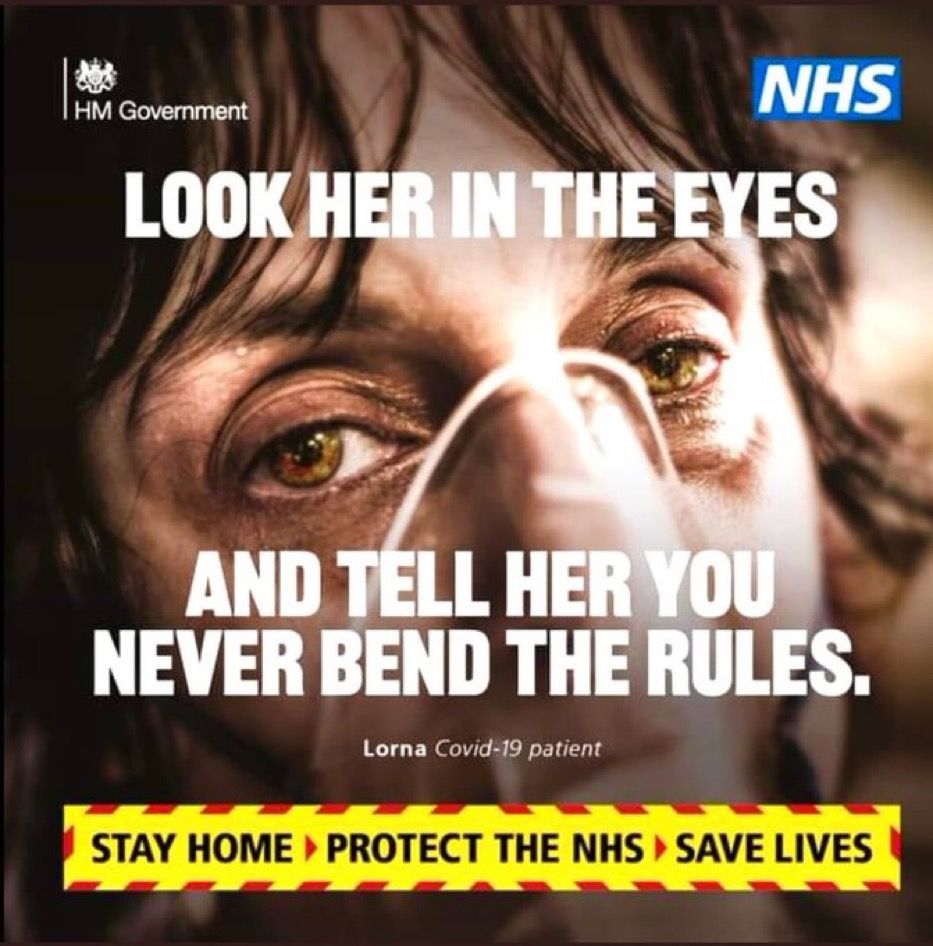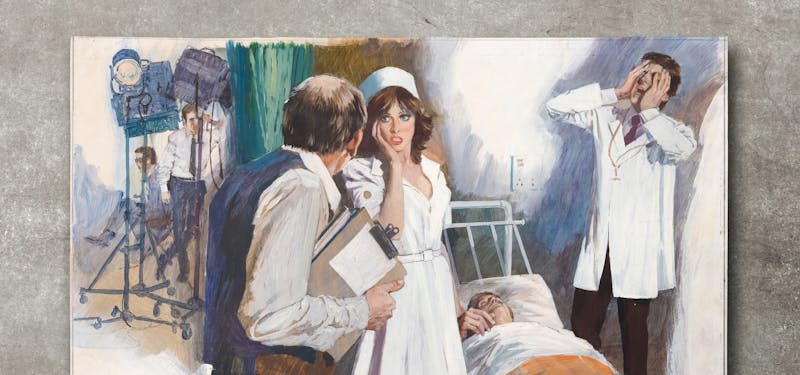Cowper’s Cut 214: A fine time

On Tuesday, some MPs will attempt to secure an answer to the question of whether Boris Johnson deliberately misled Parliament - something he has denied...
— Hannah White (@DrHannahWhite) April 18, 2022
A thread 🧵 on contempt of/for the House of Commons..
Research by the Finanical Times on the number of available spare beds in the NHS was one of the bigger stories of this week.
A combination of high demand; under-availability of staff (including due to Coivd19 infections); exit block to discharge medically well people to social care; and flow problems within hospitals are melding - to toxic effect.
It is worth remembering the impact of pandemic trauma on the staff, as highlighted in this research published by the International Journal of Environmental Research And Public Health.
Clearly, we need bigger hospitals: that's bound to solve the problem.
What a relief to know that the Government is bringing us 40/48 new hospitals ... oh, hang on.
Health Service Journal noted that a batting order for the 'new hospitals' has been announced. Not only this, but the Department for Health But Social Care's New Hospitals Programme set out details of their plan to hire professional services firms to help deliver the 40 “new hospitals” by 2030, with the contracts for such intermediaries set to total more than £550 million.
The case for this further procurement of external consultancies could be argued either way. The relevant procurement skills certainly do not exist in either DHBSC or NHSE: equally, the long-term nature of this need is such that it might well be more sensible and cost-effective to create in-house capacity and capability.
Let them catch Covid19: liability and responsibility
Another significant point this week was the joint announcement between the DHBSC, NHS England, the UK Health Security Agency and the devolved governments' health agencies of a major reduction in infection controls measures for those with Covid19, or close contacts thereof.
Let them catch Covid, basically. This is living with it, incarnate.
According to HSJ's coverage, "the isolation period for inpatients with covid-19 can now be reduced from 10 days to seven if they have two negative lateral flow tests. The tests must be taken on two consecutive days from day six of the isolation period onwards, and the patient must also “[show] clinical improvement”.
"Inpatients considered contacts of people with covid-19 also no longer have to isolate if they are asymptomatic."
Whether or not this increases capacity and capability (and we have very little way of knowing, other than by anecdotes), the implications of this are potentially significant. To actually throw in the towel in this way is a bold move, and one with legal liability consequences.
The latest ONS survey data tracks an ongoing fall in infections, but it is still about 1 person in 17 in England with Covid19.
And we wait to see the impact of Easter holiday mixing, travel and the return to schools.
The latest ONS data also shows far lower levels of compliance with self-isolating while people are infected, as The Times picked up.
What could conceivably go wrong?
Oh yes, the latest calculations on NHS pensions might not make people more happy.
The data day
NHS England's paranoid media strategy over the tech companies' roles in helping fight the pandemic is well and truly in the past, as shown in this Telegraph piece emphasising the use of Faculty's predictive modelling tools used to help at the peaks of covid19 now moving to act on the NHS backlog.
Meanwhile, Bloomberg spotted Palantir's appointment of ex-NHS Kiss head of AI Dr Indra Joshi, a mere month after she stood down from the national job as Kiss was folded into the Borg of NHS England. (COI declaration here: I sit on Palantir's advisory board.)
As HSJ's Nick Carding noted, NHSE employee contracts state officials must not lobby the UK government in relation to any aspect of national or regional health policy “with a view to promoting or advancing your own business interests or those of any third party” within six months of leaving.
The contracts also state that departing officials must not within six months of leaving “solicit the employment or engagement of any person who immediately prior to termination of your employment was a senior employee in a managerial, executive or technical capacity of your employers who could materially damage the employers’ interests if they left the organisations with whom you worked and with whom you had contact or whose work you were aware of in the 12 months prior to such termination”.
Cronyvirus and coronamillions update
Various people picked up on the evidence from DHBSC senior civil servants Jonathan Marron and Chris Wormald to the Public Accounts Committee inquiry on management of PPE contracts this week, about the fate of surplus or inadequate PPE.
Mountains of surplus PPE will be burned to generate electricity, Dept of Health permanent secretary tells @CommonsPAC
— Chris Smyth (@Smyth_Chris) April 20, 2022
Who knew Covid procurement was reducing our reliance on Russian gas all along?
The figure of £461 million pounds wasted on unusable PPE was used.
Added to this, we saw the National Audit Office publish its report on the Government's cross-border travel policies. It is Not Good.
The DHBSC (which let the £385 million contract to Corporate Travel Management to run the hotels) stated that about £74 million of bills covering rooms and Covid tests have not been paid. Another £18 million was fraudulently reclaimed in credit card chargebacks, but only two cases have been investigated or challenged.
Overall, the quarantine hotels cost taxpayers a staggering £400 million, despite their vast cost and inadequate customer experiences.
You can't keep a Bad Bot down: Babylon shares keep on tanking
See below. Couldn't happen to a nicer firm.
And Dr David Watkins truly did try to warn people, again and again and again.
Hey-ho: it's only venture capital cash wasted on a non-defendable niche with vapourware tech promises.
I did try to warn you....@babylonhealth $bbln #DeathByChatbot @BadBotThreads https://t.co/KErFxiydfU pic.twitter.com/yXlbrBaXYK
— Dr Murphy (aka David Watkins) (@DrMurphy11) April 22, 2022
Their Q1 financial results conference call in a few weeks' time should prove to be interesting.
The Alan comeback
I feel sure that subscribers will have shared my post-Paschal joy about the news of the literary event of the decade.
He is risen!
Yes, the book that absolutely nobody's been waiting for is on the way. Alan's Covid Diaries are coming soon to a 'remaindered' bookshop somewhere near you.
It's remarkable to wonder what insights and revelations The People's Partridge will bring us.
To Hancock's credit, we should add the use of a venture capital approach towards vaccines procurement contracts: that actually worked well.
On the debit side, there is rather more to weigh. Late lockdown after late lockdown; the staggering cost and incompetence of Test And Trace at meeting its principal mission; the clandestine and illegal PPE VIP fast-lane (about which ministers continue to mislead Parliament); his contemporary support for Dominic Cummings' Barnards Castle bullshitting; to say nothing of the comic hypocrisy of his attack on Neil Ferguson when Alan was later to do exactly the same thing, but in work hours and on work premises, and with someone he'd secretly employed and put on the DHBSC board.

I'd recommend that you read Julian Patterson's version of Alan's diaries: at least they're intentionally funny, and also much better value.
Oh, and at the slight danger of 'Cut' turning into 'PartridgeWatch', it emerged that Alan failed to disclose his receipt of hospitality from Conservative-donating, disgraced ex-Tory MP-Owen-Paterson-paying, Covid19-testing-contract-winner Randox.
What a mystery.
As the Guardian account says, "Hancock’s spokesperson, James Davies, said there had been no need to declare the private dinner and overnight stay at the Randox founder’s estate because it was political rather than departmental." Riiiiiight. Clearly, that makes it absolutely fine.
Bollocks of the week
A comfortable triumph for IEA alumnus and Spectator economics editor Kate Andrews for this 'nine-to-five NHS' piece in the Telegraph. Her evidence base is one anecdote, and a total mis-reading of the now thoroughly debunked Nick Freemantle work on the weekend effect.
Recommended and required reading
The Times runs a very favourable piece about Milton Keynes Hospitals FT and its CEO Joe Harrison.
Excellent Ipsos MORI podcast about public views on the NHS and social care.
Agnes Arnold-Foster's enterteining piece for the Wellcome Collection looks at Mills And Boon's role in making medicine .... erm, 'romantic'/

This very long,. near-advertorial about private healthcare in the Mail is a telling sign of the times: likewise, the new Laing Buisson report on the self-pay private sector market.

